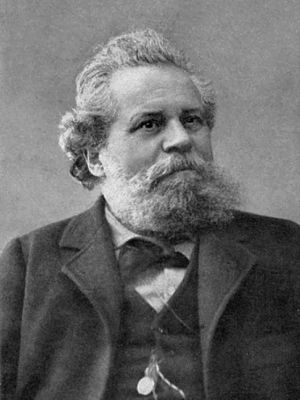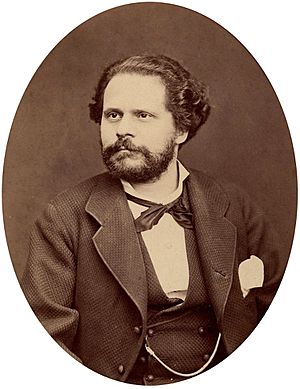Giosuè Carducci facts for kids
Quick facts for kids
Giosuè Carducci
|
|
|---|---|
 |
|
| Born | Giosuè Alessandro Giuseppe Carducci 27 July 1835 Valdicastello di Pietrasanta, Tuscany |
| Died | 16 February 1907 (aged 71) Bologna, Italy |
| Occupation | Poet |
| Nationality | Italian |
| Notable awards | Nobel Prize in Literature 1906 |
Giosuè Alessandro Giuseppe Carducci (born July 27, 1835 – died February 16, 1907) was a very important Italian poet, writer, and teacher. He was seen as the official national poet of modern Italy. In 1906, he became the first Italian to win the Nobel Prize in Literature. He received this award for his deep knowledge, creative energy, fresh writing style, and strong poetry.
About Giosuè Carducci's Life
Giosuè Carducci was born in Valdicastello, a small town in Tuscany, Italy. His father was a doctor who supported Italy becoming one united country. Because of his father's political ideas, Giosuè's family moved many times when he was a child. They eventually settled in Florence for a few years.
Even when he was in school, Giosuè loved the simple and clear style of ancient Greek and Roman writers. His later poems often used the same rhythm and style as famous Latin poets like Horace and Virgil. He even translated a part of Homer's Iliad into Italian.
Carducci earned a scholarship to study at a famous school called the Scuola Normale Superiore di Pisa. After finishing his studies in 1856, he started teaching. The next year, he published his first book of poems, called Rime.
In 1859, he married Elvira Menicucci, and they had four children. He taught Greek for a short time at a high school. Then, he became a professor of Italian Literature at the University of Bologna. One of his students there was Giovanni Pascoli, who also became a famous poet. Pascoli later took over Carducci's teaching position at the university.
Carducci was a very popular speaker. He was also a strong critic of books and society. When he was young, he had strong views against the Catholic Church. Later in his life, his views on religion changed. He began to believe in a "Universal God of Peoples," which he spoke about in a famous speech in 1894.
One of his well-known poems was "Inno a Satana" ("Hymn to Satan"). This poem was seen as a way to show rebellious and free-thinking ideas. It was published when many people in Italy wanted to end the Pope's control over certain areas.
While "Inno a Satana" was very impactful, Carducci's best poems came later. His collections Rime Nuove (New Rhymes) and Odi Barbare (Barbarian Odes) are considered his greatest works.
He was the first Italian to win the Nobel Prize in Literature in 1906. The King of Italy also made him a senator in 1890. In politics, he was always a strong supporter of liberalism, which means he believed in individual rights and freedoms. He was also a Freemason, a member of a social and charitable organization.
Even though he is most famous for his poetry, Carducci also wrote many prose works. These include literary criticism, biographies, speeches, and essays. They fill about 20 books! Carducci was also a great translator. He translated works by famous German writers like Goethe and Heine into Italian.
The Museum of the Risorgimento, Bologna is located in the house where Carducci died. It has an exhibit about his life and works.
Carducci's Legacy
In 1895, Carducci made peace with the Catholic Church. Years later, in 1978, Pope John Paul I spoke about him as a good example for university professors and Latin teachers.
Carducci's Works
Carducci organized his poems in different ways over time. He gave them a final order in a collection called Opere, published between 1889 and 1909. Here are some of his important poetic works:
- Rime, 1857
- Levia Gravia, 1868
- Odi barbare, 1877
- Rime nuove, 1887
- Rime e ritmi, 1899
His early poems, collected in Juvenilia (1850-1860), were inspired by classical writers. They also showed his love for beautiful writing, pure feelings, and freedom. He also appreciated the language used by everyday people.
See also
 In Spanish: Giosuè Carducci para niños
In Spanish: Giosuè Carducci para niños
- Jessie White Mario
 | Selma Burke |
 | Pauline Powell Burns |
 | Frederick J. Brown |
 | Robert Blackburn |


